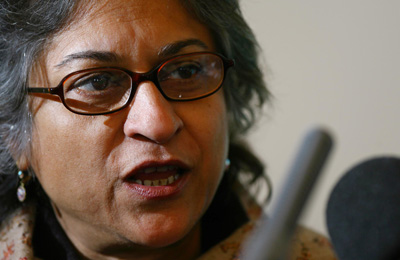There is no better time than now for U.N. High Commissioner for Human Rights Navi Pillay and EU Foreign Policy Chief Catherine Ashton to step out of their tightly planned schedule of meetings in Pakistan and make a trip to the home of human rights activist Asma Jahangir.
Jahangir, a lawyer who formerly chaired the Human Rights Commission of Pakistan, has been a staunch advocate of media freedom and journalists’ rights. She has long been the target of Pakistanis of many different sorts who resent her criticism of the social and political imbalances that mar Pakistan’s society.
Now Jahangir has revealed what she considers genuine threats to kill her. Those threats came from “a responsible and highly credible” source, according to public comments that Jahangir made Monday and to a statement released by the Human Rights Commission of Pakistan, which was signed by 44 prominent members of Pakistan’s civil society.
On Monday, Jahangir went public with the threats on some of Pakistan’s many political talk shows. She said government agencies were threatening her because of her critical remarks on the brutal tactics used to suppress the widespread ethnic unrest in Baluchistan. (See CPJ’s recent “Rising violence in Pakistan’s warring Baluchistan.”)
U.N. High Commissioner for Human Rights Pillay will be in Pakistan until June 8. During her four-day mission, she is slated to meet Prime Minister Yousuf Raza Gilani and other government ministers, as well as the Supreme Court chief justice, members of Parliament, lawyers, and civil society organizations. The EU’s foreign policy chief, Ashton, is in Pakistan until June 6, where she is launching the Pakistan-EU Strategic Dialogue. As she explained in an interview with the English-language daily Dawn, she is there to convince Pakistan that it “must invest further in what I have called ‘deep democracy’: accountability, respect for the rule of law, and protection of human rights. Elections are important, and civilian government is a prerequisite for democracy. But in themselves, these are insufficient conditions for democracy to be established and stability to develop. As we have done before, the EU will continue to offer support in building a deeper Pakistani democracy.”
